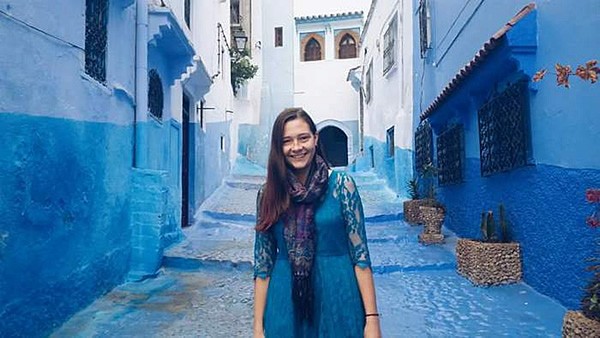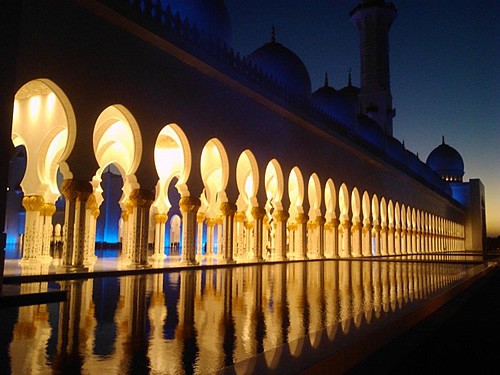Why Persevere to Learn a Language While Abroad?
The Winding Path to Speaking Arabic
Article and photos by Ema Barnes
 |
| In Chefchaouen, Morocco, storekeepers are used to only English-speaking tourists. Knowing simple phrases in Arabic went a long way. |
I always knew I would study abroad for two semesters in college, but deciding the location was the real challenge. I’d studied Spanish for three years in high school but wasn't very inspired by programs in Spanish-speaking countries. As a double major and triple minor, I was more interested in attending a foreign university where I could live alongside my dorm peers than living with a host family.
Once I began searching, I was surprised at the abundance of English-speaking universities worldwide. While your school might not necessarily have a direct exchange program, I recommend asking about non-affiliated schools — transferring their credits might be as easy as transferring credits from another American institution. I knew I didn’t want to go to Europe because I wanted to experience a non-Western culture, something really out of my comfort zone. Ultimately, I directly enrolled at the American University in Dubai on a Clinton scholarship that provided for tuition and housing and at Al-Akhawayn University in Ifrane, Morocco, through the Amideast.
Here is my advice when selecting a study abroad program.
Pick the program type that appeals most to you:
- Direct enrollment, which I chose, allows you to take a wide variety of classes and live with other students, but it might mean that you miss out on living with a host family.
- Program-specific semesters often cater to the country in which you choose to study. You might take various classes related to your country, which can lead to a deeper understanding. At the same time, the programs you choose may still be specific to your major, such as environmental science or business.
- Language-intensive programs.
Such programs usually involve language and culture, so expect to leave your country much more fluent than when you arrived.
- Multi-country programs. Similar to program-specific semesters, these will offer you a variety of courses, but in this case, they will take place in several different countries. While you experience student life and study in more locations, the program might not be as in-depth.
Arabic Language Studies in Dubai
When I boarded a plane to Dubai, I suddenly started freaking out. A 12-hour flight to my layover point of Jeddah, Saudi Arabia, provided me the first opportunity in my busy schedule to reflect. I wondered what I had just decided to do and how extreme the commitment was. I daresay that I had time to realize that I didn’t even know how to say "thank you" in Arabic, let alone ask for directions or order food. All of a sudden, I regretted not going to a Spanish-speaking country.
To my complete surprise, it’s almost more helpful to speak English in Dubai than it was to speak in Arabic. Dubai is famous for its large malls and unreal structures — they have the tallest tower, the most expensive hotel, the largest mall, a flower garden in the middle of the desert, and other structures that cost massive amounts of money. Dubai is about tourism and consumerism; it caters to the wealthy. Much of the grandiose displays of material wealth ride on the backs of poor Indian, Bangladeshi, and Filipino workers who find it more beneficial to learn English than Levantine Arabic.
 |
| The author took public transit to Sheik Zayed Grand Mosque in Abu Dhabi, United Arab Emirates. |
I took Arabic 101 in Dubai, studying Foosha, the standard Arabic spoken in academia and law by most educated people across the Middle East/North African region. I was one of two study abroad students in that class; the rest were from places other than the Emirates, where they spoke no Arabic but were brave enough to enroll as full-time students. After the first week, I left class eager to try the new words I had learned. At the local deli, where delicious sandwiches were made, I greeted the shop attendant with a friendly “Marhaba!” He responded with a tired “That’ll be thirteen dirhams” in English.
While I had struggled with Spanish, I expected learning Arabic would be much easier since I lived in a country where they spoke Arabic. I couldn’t have been more wrong. My 1000-level Arabic class was a hassle and caused me to spend more time locked up in my room studying than my other four classes combined. My Arabic-speaking friends weren’t much help — commonly, Arabic people speak in their dialect, whether the Gulf Arabic in Oman and the Emirates, the Levantine Arabic in Lebanon and Syria, Egyptian Arabic, or one of many others. I had few opportunities to practice standard Arabic and left the United Arab Emirates, quite disappointed in my language skills.
Arabic Language Studies in Morocco
I arrived in Morocco just before New Year’s, ready to take a 3-week intensive class in Darija, Moroccan Arabic, before heading to the university where I’d live. I’d be staying with a host family during this time, and I was more determined than ever to learn the language, which I’d heard was a strange combination of French and Arabic.
You can learn the language of a country in following ways:
- Learn the language before you arrive. You will know more at the outset, but that can also make it hard to learn differences in dialect, should they exist.
- Take the language throughout the period you’re abroad. By so doing, you will learn a great deal, as your teachers will often be from the region. You can practice perpetually — assuming you’re not in a place like Dubai, where English is spoken so frequently.
- Take an intensive class at the beginning of your program. While I found this challenging, it is the most efficient way to learn as long as you continue to practice.
Disembarking from the plane, I greeted the customs agent with a friendly “Marhaba!” attempting to demonstrate to him that I wasn’t just another tourist and that I was ready to try and learn about his country. He eyed me suspiciously, and I was somewhat confused; surely my appearance wasn’t that offensive? Later, I learned that while “Marhaba” is used in place of “hello” in most Arabic-speaking countries, in Morocco, it’s equivalent to saying “welcome.” I had just inadvertently welcomed a customs agent to his own country!
The next day, my language class started, with me, my teacher, and another student who already spoke fluent Foosha. This class was how I had expected to learn Arabic the previous semester; Usted Mohamed immediately taught us how to introduce ourselves and say we were students studying in Ifrane with barely a word uttered in English.
What I hadn’t expected was how hard the class would be. Though my teacher was extremely patient with me, I cried at least once each day in the first week out of sheer frustration. I asked him to write transliterations of the words down so that each Arabic word was written in its English pronunciation instead of in its Arabic letters, meaning I could at least read it without having to sound it out and check my list of Arabic characters.
I would remember exactly where in my notebook to look for the word, but I wouldn’t truly remember the word. I could communicate if I had my notebook with me and a minute to prepare each sentence, but understanding was a huge struggle. My classmate was learning extremely quickly; Darija was his fourth language, and it came more naturally to him with his prior understanding of Foosha.
After class, I’d go to a restaurant for lunch and find myself confronted with French menus. While this was possibly easier than a menu all in Arabic characters would have been, it was frustrating that I couldn’t even recognize some of the words I’d just learned. “Salam alaykum,” I’d greet my waiter weakly.
A Trip to Spain
Visiting Madrid over a long weekend during my 3-week intensive Darija course was a breath of fresh air. I learned then that I should not have underestimated my language proficiency as I was quite capable of communicating with the Spaniards; I visited a friend whose roommates spoke only Spanish. I could talk about being abroad and how gaining new perspectives on living was so eye-opening.
The three weeks in Spain were the most challenging of my time abroad. While my host parents were lovely, they had no children other than meals and didn’t expect me to hang out with them. After a semester of living in university dorms and staying in crowded hostel rooms, I found myself experiencing the incredible loneliness I’d read about by those who studied abroad. I spent more time on Skype than ever before. While putting so much effort into learning and speaking Spanish, I found myself isolated from the culture.
The Return to Morocco
On my return to Morocco, I attended Al-Akhawayn University in Ifrane, which was incredibly different from the American University in Dubai. While English had been the mode of communication in Dubai, most Moroccan students communicated in French or Darija and had to switch languages to talk to me. They found my Darija greetings endearing, but I couldn’t speak. I initially found myself regretting the intensive course.
However, the intensive course eventually paid off day-to-day. When I went to the shops, I’d greet the shopkeepers in Darija and ask them how they were. I’d ask how much things cost in — Arabic. And while I could tell them little more than that I was a student visiting from the U.S., they were delighted that I was trying to learn their language. While traveling on buses, people were surprised to find a Caucasian girl speaking their language. Although my pronunciation was horrible, they found my ability to greet them and talk for a few minutes in Darija flattering.
Conclusion
Ultimately, I was incredibly surprised by how widely English was spoken during my travels. At every hostel I stayed at, English was the lingua franca. In most major cities, shopkeepers and restaurant servers spoke a little English. Still, I cannot emphasize enough how much people appreciate it when you try to learn their language. Speaking a few simple words can be almost as valuable as understanding the whole language.
One rule I followed while abroad is that in every country you visit, you learn to say “hello” and “thank you.” Common courtesies will go far as a sign of respect. Asking people how to speak other words and phrases is a great ice breaker as well — there’s little more comical to warm and playful Arabic-speaking hosts than when you try to pronounce “kay falik?” or “How are you” correctly!
People are rightfully very proud of their countries and their cultures. They will welcome you wherever you go, and they will teach you their language and all about their lives. Through my travels, I have learned never to let a language barrier hold you back. Don't ever be so intimidated that you do not visit a new country simply because of the language.
Ema Barnes is currently a senior at McDaniel College in Westminster, Maryland, expecting to graduate in May 2017. Ema studied abroad at the American University in Dubai, United Arab Emirates, in the fall of 2015 through direct enrollment and at Al-Akhawayn University in Ifrane, Morocco, in the spring of 2016 through Amideast. Ema was originally from New Zealand and attended high school in San Francisco, CA. She majors in English and Political Science with minors in Writing, Spanish, and Computer Science. Ema has worked in three different national parks and loves to hike, read, and meet people from all over the world.
|
|
